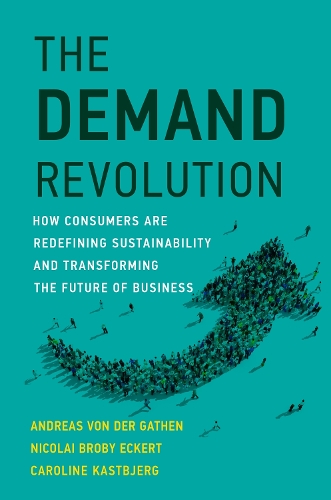
The Demand Revolution: How Consumers Are Redefining Sustainability and Transforming the Future of Business
(Hardback)
Publishing Details
The Demand Revolution: How Consumers Are Redefining Sustainability and Transforming the Future of Business
By (Author) Andreas von der Gathen
By (author) Nicolai Broby Eckert
MIT Press Ltd
MIT Press
15th October 2024
30th September 2024
United States
Classifications
General
Non Fiction
338.927
Physical Properties
Hardback
264
Width 152mm, Height 229mm
Description
Sustainability is rocking the business world as profoundly as global trends of the past have, from electrification to digitalization. But unlike previous revolutions, this one is being driven by consumers, for whom environmentally sound practices matter as much as price, quality, and brand. In The Demand Revolution authors Andreas von der Gathen, Nicolai Broby Eckert, and Caroline Kastbjerg offer a strategic framework for winning these consumers-and taking advantage of the vast commercial opportunity presented by sustainability as the first demand-driven, transformative megatrend. The first movers in the Demand Revolution will be able to create enduring competitive advantages and high entry barriers built around redesigned business model ecosystems and customer loyalty, the authors explain, but this will require a critical adjustment in thinking and approach. Companies, first of all, have to catch up with consumers, who see themselves on a demand curve far beyond what companies currently perceive. Business leaders must shift their focus from the cost of sustainability to its potential for generating growth and long term profits. This, in turn, means recognizing that the classic adoption curves for innovations-and the strategic playbooks derived from those insights-no longer apply. The authors of The Demand Revolution show business leaders how to look beyond easy fixes and incremental outcomes and instead pursue high-risk, high reward moves built on the source of exponential growth- the world's consumers. How consumer desire for sustainability is powering the first demand-driven, transformative megatrend-and how business leaders can make the most of this important moment. Sustainability is rocking the business world as profoundly as global trends of the past have, from electrification to digitalization. But unlike previous revolutions, this one is being driven by consumers, for whom environmentally sound practices matter as much as price, quality, and brand. In The Demand Revolution authors Andreas von der Gathen, Nicolai Broby Eckert, and Caroline Kastbjerg offer a strategic framework for winning these consumers-and taking advantage of the vast commercial opportunity presented by sustainability as the first demand-driven, transformative megatrend. The first movers in the Demand Revolution will be able to create enduring competitive advantages and high entry barriers built around redesigned business model ecosystems and customer loyalty, the authors explain, but this will require a critical adjustment in thinking and approach. Companies, first of all, have to catch up with consumers, who see themselves on a demand curve far beyond what companies currently perceive. Business leaders must shift their focus from the cost of sustainability to its potential for generating growth and long term profits. This, in turn, means recognizing that the classic adoption curves for innovations-and the strategic playbooks derived from those insights-no longer apply. The authors of The Demand Revolution show business leaders how to look beyond easy fixes and incremental outcomes and instead pursue high-risk, high reward moves built on the source of exponential growth- the world's consumers.
Author Bio
Andreas von der Gathen is Senior Partner and co-CEO at Simon-Kucher in Bonn. Previously he served for more than 20 years as a partner and as the global head of the firm's consumer & retail practice. Nicolai Broby Eckert is Senior Partner and co-Head of the Nordics at Simon-Kucher in Copenhagen. He has worked for 22 years with corporate and commercial strategy for some of the largest companies in the Nordics and is a passionate angel investor. Caroline Kastbjerg is Senior Manager with Simon-Kucher in Copenhagen. She has broad experience working on commercial initiatives for some of the largest companies across the Nordics.
